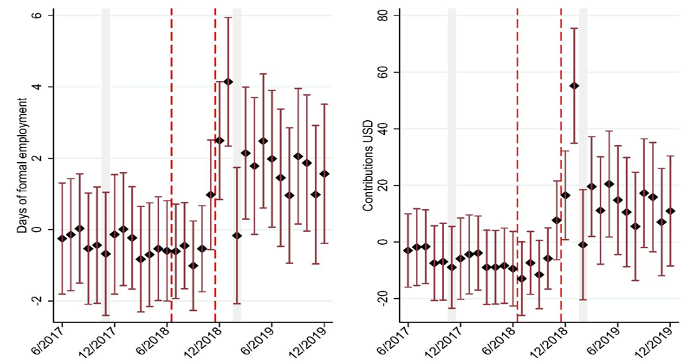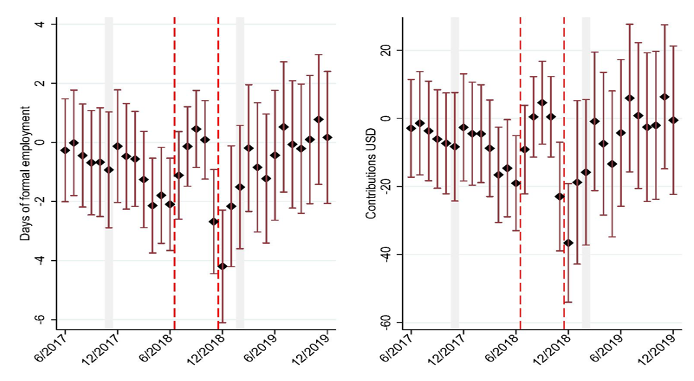Given the importance of labour market outcomes for the wellbeing of individuals and households around the globe, policymakers are growing increasingly interested in the role of vocational training in helping to improve the transition between formal schooling and employment. Still, whether or not vocational training programmes succeed in improving the labour market outcomes of their participants is highly debated, and empirical evaluations of vocational programs report mixed results. While some programs suggest positive and sustained impacts (Kugler et al. 2020, Silliman and Virtanen 2019, Brunner et al. 2019, Attanasio et al. 2017, Attanasio et al. 2011), others report no effects (Hicks et al. 2015). Moreover, even the positive effects of some vocational programs that succeed in improving labour market outcomes in the short term can dissipate in only a few years (Acevedo et al. 2017, Alzua et al. 2016, Hirshleifer et al. 2016).
A common explanation for the short-lived returns to some of these vocational programmes is that their narrow focus may not provide the flexibility required to adapt to changes in the nature of work (Hanushek et al. 2017, Krueger and Kumar 2004). Particularly as we live in a period characterised by rapid technological change (Brynjolfsson and McAffee 2011), economists argue that general – rather than narrow – skills better equip people for adapting to labour market changes (Goldin and Katz 2009, Acemoglu and Autor 2011, Goos et al. 2014, Deming and Noray 2018). Interestingly, social skills are seen as central amongst these increasingly important general skills (Deming 2017). Despite the excitement around the role of social skills in allowing workers to adapt to labour market changes, there remains little credible experimental evidence of whether social skills training can lead to sustained labour market returns.
Experimenting with social skills
In a recent paper, we design an experiment to test whether or not social skills can, in fact, help sustain the labour market returns of vocational programmes (Barrera-Osorio et al. 2020). Working with the Carvajal Foundation, we implement our experiment as part of the Inclusive Employment Program (IEP) in Cali, a large city in Colombia. The target population of the programme is individuals from low-income households and communities. The courses were all in the service sector in each of the following areas: sales and client services, general services, surveillance and security services, cashiers, quality control assistant, cooking assistant, delivery assistant, and storage assistant.
To isolate the relative impact of hard (technical) versus soft (social) skills in vocational training, we randomly assign applicants to otherwise identical oversubscribed vocational programmes, varying the intensity of hard versus soft skills training. For the same course, some individuals are randomly assigned to a track of 100 hours of technical training (hard skills), and 60 hours of soft training (social skills); other individuals are randomly assigned to a track of 100 hours of soft training and 60 hour of technical training. Since the programmes are oversubscribed, we also have one set of applicants who do not receive a place in a vocational programme to serve as a control group.
We combine our own baseline and end-line survey results with high-quality administrative data from national social security records, and we follow the outcomes of applicants to these vocational programmes, keeping a fine eye on their subsequent labour market dynamics.
Large overall returns
In aggregate, we find large and sustained returns to vocational training. The programme pays for itself in about seven months. This is evidenced in our administrative data by increases in days and months of employment as well as increased social security deposits, a proxy for formal sector wages (Figure 1). Our survey data complement our administrative data and show that vocational training improves organisational skills. Our survey data also suggest that while these results are partly driven by a shift into the formal sector, vocational training increases aggregate employment by five days a month, or seven days a week, when we include data from the informal sector.
Figure 1 Aggregate effects on employment and social security deposits
Social skills and labour market dynamics
Next, we look at the effects of hard versus soft skills in vocational training on labour market dynamics. We find a larger initial increase in employment resulting from the programme emphasising technical skills but we also see that these benefits appear to dissipate with time, whereas for the training emphasising social skills this does not look to be the case. We then formally test whether or not there are dynamics in formal employment, days worked, and wages of applicants randomised into the different programs and find that they are statistically different from each other (Figure 2).
Figure 2 Labour market outcomes: Social versus technical training
Constraints to participation
As part of the experiment, we also look to understand whether resource constraints might prevent individuals from enrolling in vocational programmes – even if these programmes offer potentially large rewards. To do this, in a second level of randomisation, we provide half the participants in both the hard and soft skills programmes with a stipend to cover transport costs. Highlighting the importance of resource constraints, we find larger effects of vocational training for those who receive stipends. We also examine gender differences in the returns to vocational training, and find that men experience heightened benefits from the programme. This suggests that skills alone may be insufficient for helping women to overcome other barriers to employment such as lack of access to childcare.
Adding to the evidence base
Our paper adds some of the first evidence directly testing whether or not combining narrower technical training with general skills components can help sustain labour market returns in the longer term (Acemoglu and Autor 2011, Deming 2017, Deming and Noray 2018). Additionally, it may help provide clues as to why prior studies of vocational programmes report such mixed results, thus helping to explain why some vocational programmes from around the world that have general skill components provide long-run benefits (Kugler et al. 2020, Silliman and Virtanen 2019, Brunner et al. 2019, Attanasio et al. 2017, Attanasio et al. 2011).
Our results also offer insights to policymakers considering the role of vocational training in making their labour market opportunities more equal. Vocational training can help boost employment prospects, and with general skills components might be able to provide sources of long-term rewards. We also find that, particularly in lower-income and middle-income contexts, resource constraints may prevent individuals from making investments in vocational training.
Authors’ note: A version of this column first appeared on VoxDev.org.
References
Acemoglu, D and D Autor (2011), “Skills, Tasks and Technologies: Implications for Employment and Earnings”, in Handbook of Labor Economics, Volume 4, pages 1043-1171, Elsevier.
Acevedo, P, G Cruces, P Gertler and S Martinez (2017), “How Job Training Made Women Better Off and Men Worse Off”, NBER Working Paper No. 23264 (forthcoming in Labour Economics).
Alfonsi, L, O Bandiera, V Bassi, R Burgess, I Rasul, M Sulaiman and A Vitali (2017), “Tackling Youth Unemployment: Evidence from a Labor Market Experiment in Uganda”, STICERD-Development Economics Papers.
Alzua, M I, G Cruces and C Lopez (2016), “Long-Run Effects of Youth Training Programs: Experimental Evidence from Argentina”, Economic Inquiry 54(4): 1839-1859.
Attanasio, O, A Guarin, C Medina and C Meghir (2017), “Vocational Training for Disadvantaged Youth in Colombia: A Long Term Follow Up”, American Economic Journal: Applied Economics 9(2): 131-143.
Attanasio, O, A Kugler and C Meghir (2011), “Subsidizing Vocational Training for Disadvantaged Youth in Colombia: Evidence from a Randomized Trial”, American Economic Journal: Applied Economics 3(3): 188-220.
Barrera-Osorio, F, A Kugler and M Silliman (2020), “Hard and soft skills in vocational training: Experimental evidence from Colombia”, NBER Working Paper No. 27548.
Brunner, E, S Dougherty and S Ross (2019), “The Effects of Career and Technical Education: Evidence from the Connecticut Technical High School System”, EdWorking Paper No. 19-112, Annenberg School, Brown University.
Brynjolfsson, E and A McAfee (2011), Race against the machine: How the digital revolution is accelerating innovation, driving productivity, and irreversibly transforming employment and the economy, Digital Frontier Press.
Deming, D J (2017), “The Growing Importance of Social Skills in the Labor Market”, Quarterly Journal of Economics 132(4): 1593-1640.
Deming, D J and K Noray (2018), “Stem Careers and Technological Change”, NBER Working Paper No. 26092.
Goldin, C and L Katz (2009), The Race Between Education and Technology, Cambridge, MA: Harvard University Press.
Goos, M, A Manning and A Salomons (2014), “Explaining Job Polarization: Routine-biased Technological Change and Offshoring”, American Economic Review 104(8): 2509-26.
Hanushek, E A, G Schwerdt, L Woessmann and L Zhang (2017), “General Education, Vocational Education, and Labor-market outcomes over the lifecycle”, Journal of Human Resources 51(1): 48-87.
Hicks, J H, M Kremer, I Mbiti and E Miguel (2015), Vocational education in Kenya—A randomized evaluation, 3ie Grantee Final Report. New Delhi: International Initiative for Impact Evaluation (3ie).
Hirshleifer, S, D McKenzie, R Almeida and C Ridao-Cano (2016), “The Impact of Vocational Training for the Unemployed: Experimental Evidence from Turkey”, Economic Journal 126(597): 2115-2146.
Krueger, D and K B Kumar (2004), “Skill-specific Rather than General Education: A Reason for US-Europe Growth Differences?”, Journal of Economic Growth 9(2): 167-207.
Kugler, A, M Kugler, J Saavedra and L O Herrera-Prada (2020), “The Long-term Impacts and Spillovers of Training for Disadvantaged Youth”, Journal of Human Resources, forthcoming.
Silliman, M and H Virtanen (2019), “Labor Market Returns to Vocational Secondary Education”, ETLA Working Papers. No 65.





